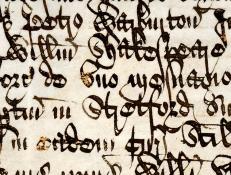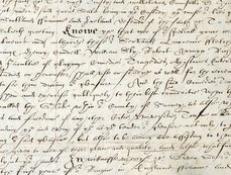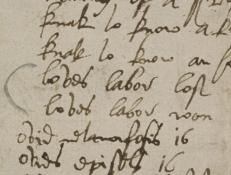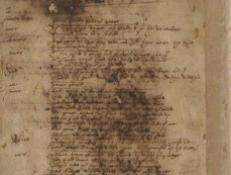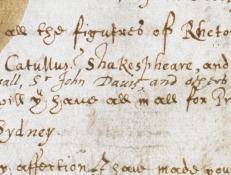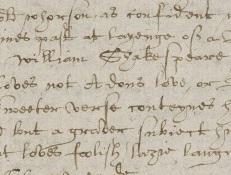To view a sortable list, please visit the Resource
All Documents
1602
This is the foot of fine, one of the three copies of the final concord ratifying Shakespeare’s purchase of New Place in 1602. It has been filed with other Warwickshire “feet” among the records of the Court of Common Pleas since 1602.
May 18, 1603
Although James VI of Scotland was proclaimed king of England on March 24, 1603, it took him over a month to arrive in London.
August 9-17 1603
This fragment from the account book of a stationer in southern England provides evidence of a bookseller’s stock in the early seventeenth-century, with a tally of items sold over the course of a few days in August 1603.
1604
SHAKESPEARE DOCUMENTED IS STILL GROWING! Descriptive content and transcriptions will continue to be added, updated and expanded. Check back for regular updates!
ca. 1603- 1604
Sir Thomas More is a collaboratively written play that survives only in a single manuscript.
after 1605
Richard Carew (1555-1620) was a British antiquary, most famous for his Survey of Cornwall (1602).
ca. 1606
In several scenes, the Cambridge University play Progress to Parnassus mocks the literary tastes and talents of the London commercial stage, depicting Shakespeare as a popular but unsophisticated playwright and poet.
1609
At first glance, this copy of Shakespeare’s Sonnets, also published in 1609, might look just like the copy at the University of Manchester Library. However, there is a slight difference in the second-to-last line of the imprint.
April 30, 1610
During a diplomatic visit to England in 1610, the Protestant German prince Louis Frederick Würtemberg attended a performance of Othello--“l’histoire du More de Venise”--at the Globe.
1609- 1610
The poet and courtier Sir John Harington left behind tantalizing lists of plays written by Shakespeare, Ben Jonson, Thomas Middleton, Thomas Heywood, and others. Around 1609 he compiled two lists of play quartos almost certainly in his personal collection.

